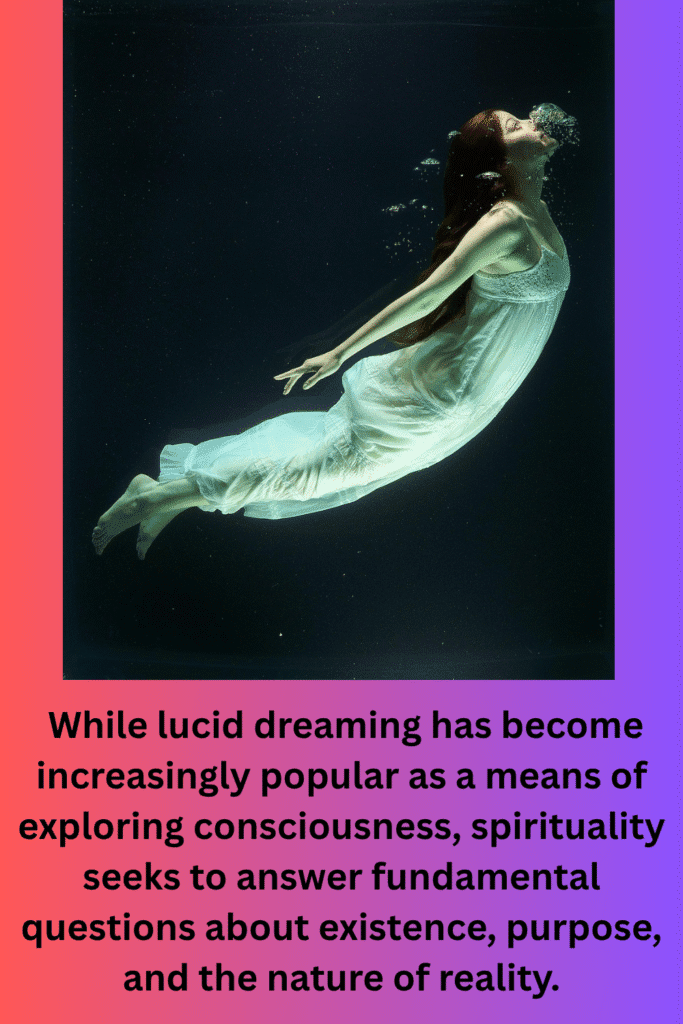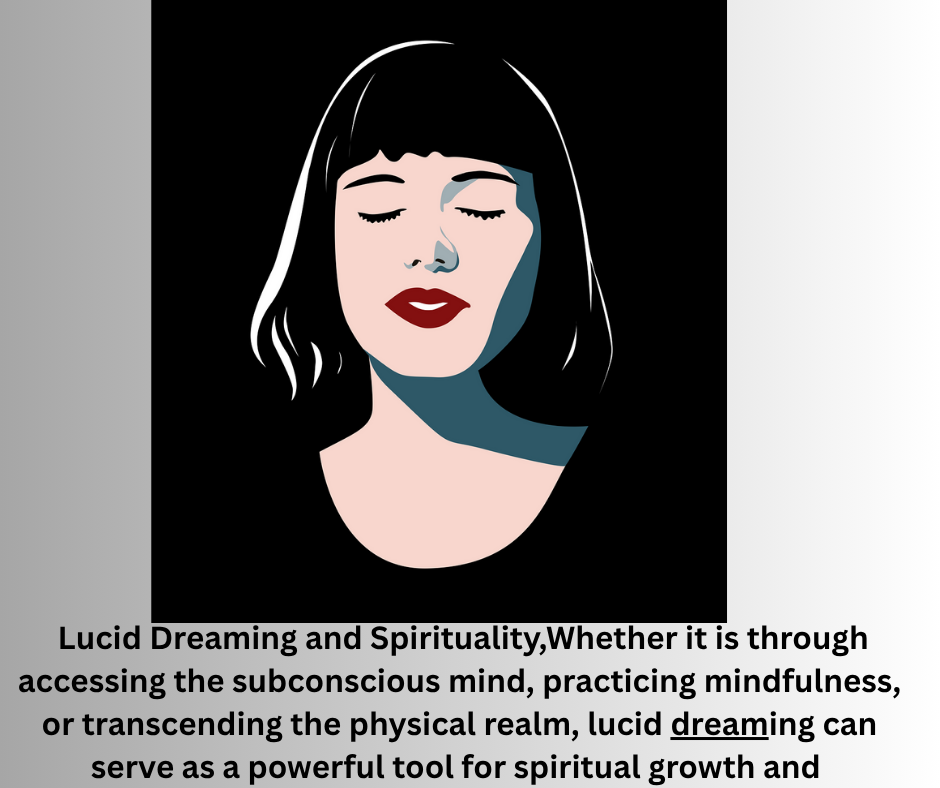Lucid dreaming and spirituality have long been topics of fascination for people seeking to understand the deeper aspects of human consciousness, reality, and self-exploration. At the intersection of these two areas lies an intriguing blend of psychology, metaphysics, and personal transformation. While lucid dreaming has become increasingly popular as a means of exploring consciousness, spirituality seeks to answer fundamental questions about existence, purpose, and the nature of reality.

But what is the connection between these two concepts, and how can lucid dreaming support spiritual growth? In this article, we will explore the relationship between lucid dreaming and spirituality, looking at their shared principles, potential benefits, and the ways in which lucid dreaming can serve as a tool for spiritual development.
Table of Contents
What is Lucid Dreaming?
The sensation of recognizing that you are dreaming while still in the dream is known as lucid dreaming. In a lucid dream, the dreamer has the ability to control or influence the events and surroundings within the dream, as well as the characters and scenarios that unfold. Lucid Dreaming and Spirituality,A lucid dreamer is completely aware that they are dreaming and is able to move intentionally around the dream environment, in contrast to regular dreaming, in which the dreamer is passive and ignorant of the dream state.
Lucid dreaming has been studied by scientists, psychologists, and even spiritual practitioners for its potential in improving mental health, enhancing creativity, and offering insights into the subconscious mind. This unique form of dreaming allows individuals to transcend the boundaries of ordinary reality, providing an altered state of consciousness in which one can experiment with personal growth, healing, and self-discovery.
What is Spirituality?
The term “spirituality” is broad and includes a variety of ideas, behaviors, and experiences pertaining to the pursuit of transcendence, meaning, and connection. Although spirituality may be associated with various religious traditions, it is not limited to a single belief system.
Spirituality can involve seeking a deeper understanding of the self, the universe, and one’s purpose in life. It often involves practices such as meditation, prayer, mindfulness, and contemplation, which help individuals develop a stronger sense of inner peace, connection to the divine, and personal transformation.
Fundamentally, spirituality is the study of awareness and the pursuit of knowledge about reality, existence, and the self. Many spiritual traditions teach that there is more to reality than what is immediately apparent in the physical world. Lucid Dreaming and Spirituality,Concepts such as the soul, higher consciousness, and spiritual realms are central to many belief systems, and they often emphasize the importance of personal experience and awakening to a higher state of awareness.
The Connection between Lucid Dreaming and Spirituality
1. Lucid Dreaming as a Tool for Self-Exploration
One of the most significant ways that lucid dreaming and spirituality intersect is through the potential for self-exploration. In various spiritual practices, self-awareness is viewed as an essential element of individual and spiritual development
. Lucid dreaming provides an opportunity to explore aspects of the self that may remain hidden in waking life, allowing the dreamer to engage in direct, experiential exploration of their inner world.
For example, in lucid dreams, individuals can confront fears, trauma, and unresolved emotions in a safe and controlled environment. This can lead to healing and personal transformation, as the dreamer gains insight into the root causes of their issues. Lucid Dreaming and Spirituality,Additionally, lucid dreaming can be used to practice self-compassion, acceptance, and understanding, which are important components of many spiritual practices.
In many spiritual teachings, the ultimate goal is to achieve a higher level of self-realization—an understanding of one’s true nature beyond the ego and physical form. Lucid dreaming can support this journey by offering a direct experience of consciousness that transcends the limitations of the physical world, allowing the dreamer to encounter parts of themselves that are typically inaccessible during waking life.
Connection to the Subconscious Mind
Both lucid dreaming and spirituality acknowledge the power of the subconscious mind in shaping our perceptions, behaviors, and experiences. Spiritual traditions often teach that the subconscious mind holds key insights into our deeper nature and that becoming aware of these hidden aspects of the psyche is essential for spiritual growth. Lucid dreaming, as a conscious exploration of the dream world, provides a gateway to understanding the subconscious mind more intimately.
In a lucid dream, the dreamer can engage with symbols, archetypes, and recurring themes that arise from the subconscious. These symbols might possess spiritual meaning or provide clarity on unresolved matters. By actively interacting with the dream world, the dreamer can begin to untangle the meanings behind their subconscious experiences and gain clarity about their spiritual journey. Lucid Dreaming and Spirituality,This can lead to greater self-awareness, a deeper understanding of one’s purpose, and a more profound connection to the spiritual realms.
Spiritual Practices in the Dream World
Lucid dreaming can also serve as a powerful tool for practicing spiritual techniques within the dream world itself. Just as individuals may practice meditation, visualization, or prayer during waking hours, they can incorporate these practices into their lucid dreams. For example, a lucid dreamer may use the dream state to engage in meditation or deep contemplation, focusing on spiritual questions or seeking guidance from higher beings.
Many spiritual traditions emphasize the importance of prayer or communion with the divine, and lucid dreams can offer a unique setting for these experiences. Lucid Dreaming and Spirituality,Some lucid dreamers report encounters with spiritual guides, angels, or ancestors, providing them with messages of wisdom, comfort, and insight. These encounters can feel profoundly real and transformative, offering a direct connection to the spiritual realm.
Additionally, lucid dreaming can be used to explore other dimensions or realms of existence that are beyond the physical world. In some spiritual practices, it is believed that the dream world serves as a gateway to alternate realities, other planes of consciousness, or the afterlife. Lucid dreaming provides an opportunity to explore these realms consciously and with intention, deepening one’s understanding of the nature of reality and the interconnections of all things.
Expanded Consciousness and Transcendence
At a deeper level, lucid dreaming can be a means of transcending the limitations of the physical body and accessing higher states of consciousness. Spirituality often involves seeking states of awareness that go beyond the ordinary, and lucid dreaming allows individuals to experience altered states of consciousness where they can experience a sense of unity with the universe, access profound insights, or even experience spiritual awakening.
In some instances, lucid dreams may mirror the experiences of spiritual enlightenment, such as a sense of oneness with all things, a dissolution of the ego, or the encounter of divine light or energy. Lucid Dreaming and Spirituality,For those on a spiritual path, lucid dreaming offers a direct and experiential way of exploring states of consciousness that are often described in mystical or esoteric traditions.

Lucid Dreaming as a Path to Mindfulness
Mindfulness, which involves being fully present in the moment and cultivating an awareness of one’s thoughts and emotions, is a key practice in many spiritual traditions. Lucid dreaming, by its very nature, fosters mindfulness, as the dreamer must remain aware of their state of consciousness and actively engage with the dream world. This heightened awareness during dreams can translate into greater mindfulness during waking life, helping individuals live more consciously and with greater spiritual presence.
Conclusion
Lucid dreaming and spirituality are deeply intertwined, offering rich opportunities for personal and spiritual exploration. Lucid dreaming provides a unique space where individuals can engage in self-discovery, confront inner obstacles, practice spiritual techniques, and explore altered states of consciousness. Lucid Dreaming and Spirituality,Whether it is through accessing the subconscious mind, practicing mindfulness, or transcending the physical realm, lucid dreaming can serve as a powerful tool for spiritual growth and transformation.
As more people explore the potential of lucid dreaming, it is likely that the relationship between these two realms will continue to evolve, offering new insights into the nature of consciousness, reality, and the human spirit. Whether one is seeking healing, enlightenment, or simply a deeper understanding of the self, lucid dreaming provides a powerful and transformative way to engage with the mysteries of the mind and spirit.